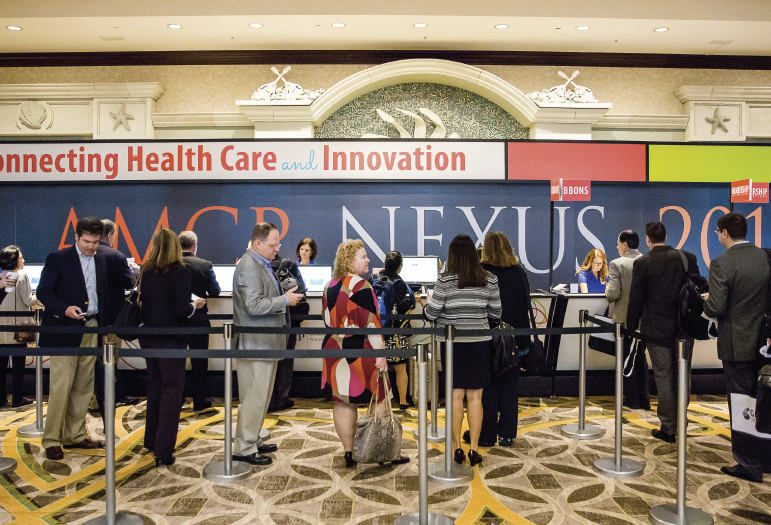Meeting Preview: AMCP Nexus 2016
 The upcoming AMCP Nexus 2016 Meeting (October 3-6 at the Gaylord National Hotel & Convention Center in National Harbor, Maryland) will bring together thousands of managed care professionals from all across the United States. Attendees will gain valuable knowledge on the latest innovations and important clinical, government, and business issues facing the industry. Educational sessions will provide attendees with the latest insights into managed care pharmacy, best practices, and how recent regulatory and legislative activities will impact their profession. Managed care professionals will also be introduced to powerful tools to help find solutions for issues ranging from improving outcomes to reducing heath care costs.
The upcoming AMCP Nexus 2016 Meeting (October 3-6 at the Gaylord National Hotel & Convention Center in National Harbor, Maryland) will bring together thousands of managed care professionals from all across the United States. Attendees will gain valuable knowledge on the latest innovations and important clinical, government, and business issues facing the industry. Educational sessions will provide attendees with the latest insights into managed care pharmacy, best practices, and how recent regulatory and legislative activities will impact their profession. Managed care professionals will also be introduced to powerful tools to help find solutions for issues ranging from improving outcomes to reducing heath care costs.
To help inform and excite attendees, First Report Managed Care has compiled a brief overview of the meeting, highlighting the educational sessions that can’t be missed. Please refer to the final program and meeting website (www.amcpmeetings.org) for a complete list of all sessions, speakers, locations, and other events.
AMCP General Session
The AMCP Nexus 2016 general session will feature two keynote speakers with insider experience on government health policy: former health advisor to President Obama, Chris Jennings’, and former Utah Governor, Mike Leavitt. The session will be moderated by health care policy expert Susan Dentzer.
The topic for the general session keynote is “America’s Landmark Presidential Election – What Lies Ahead?”
Mike Leavitt’s experience as Department of Health and Human Services secretary under President George W Bush, and Chris Jennings experience as health care advisor to multiple US presidents will give the audience a balanced perspectives on the current and future state of the American health care system.
Education Tracks
The education sessions are categorized in 7 targeted program tracks:
• The Basics of Key Managed Care Pharmacy Topics
A look at what industry and marketplace factors are impacting the practice of managed care pharmacy.
• Current Aspects in Specialty Pharmacy
Management
Advances and new options in specialty pharmacy, such as managing drug spending and utilization, will be discussed.
• Drugs, Diseases and the Managed Care Impact
How managed care fits into the spectrum of diseases and treatments.
• The Evolving Health Care Environment
A look at how the landscape of health care is evolving, highlighting strategies to tackle these complex changes.
•Putting Managed Care Pharmacy Research to Work
Strategies for how to employ groundbreaking research conclusions in order to get real-world results.
• Research and Its Practical Application
How managed care research is being used in daily and long-term decision-making.
•Staying on Course with Legislative and Regulatory Issues
An overview of the complex policy changes that affect managed care professionals.
HIGHLIGHTED SESSIONS
Tuesday, October 4, 2016
On Tuesday October 4, 2016, Chris Jennings, president of Jennings Policy Strategies, and Mike Leavitt, former Utah Governor and HHS secretary, will discuss the future of health care under the next President of the United States during the AMCP Nexus 2016 general session.
• 8:45 AM-10:00 AM
Specialty Pharmaceuticals in Development
The trend over the last several years has shown that drug approvals of specialty medications have far outpaced those of traditional drugs. One question on stakeholders’ minds is “How will these specialty medications affect the dynamic health care landscape and managed care pharmacy?” During the session, faculty will focus on the pipeline of new and emerging therapies in this drug class and look at their role in therapy. Faculty will also discuss the potential impact of these agents on managed care markets.
• 9:35 AM-11:05 AM
Treating Opioid Use Disorder and Reversing Opioid Overdose
Opioid misuse has quickly become an epidemic across the country, spanning every age group, socioeconomic class, and geographic region. With a significant proportion of patients meeting the diagnostic criteria for opioid misuse disorder and an ever-growing amount of deaths associated with overdose, managed care professionals are caught between trying to manage pain for patients and trying to curb this growing epidemic. This session will review the latest perspectives and tools available to help managed care professionals dealing with prescription opioids.
• 12:30 PM-2:00 PM
Implementing Precision Medicine into Primary Care
This session will help managed care professional struggling to understand the complex and oftentimes confusing world of precision medicine. Groundbreaking uses for genetic information are being discovered every day, making the practicalities of precision medicine difficult to identify. This session will provide key concepts of precision medicine and ways to integrate those concepts into primary care. Presenting faculty include Sandra Leal, PharmD, MPH, and Nicole Scovis, PharmD.
 Wednesday, October 5, 2016
Wednesday, October 5, 2016
• 8:00 AM-9:30 AM
Biomarkers and Treatment Decision-Making: Focus on Rheumatoid Arthritis
In this session, professionals will be given insight into how biomarkers can be used to determine disease progression and potentially identify the best course of treatment. The presenters will use rheumatoid arthritis as an example of how biomarkers can be used efficiently within the office and how to determine the necessity of these tests from the perspective of a payer. This panel discussion will includ a health plan provider, clinical pharmacist, and medical director, in order to provide a range of perspectives.
• 9:50 AM-11:20 AM
Interchangeable Biologics and Biosimilars: The Federal and State Perspective
Many states have laws requiring pharmacy notification when dispensing interchangeable biologics; however, very few of these laws acknowledge the dispensing of biosimilars. This session will highlight the federal perspective and state laws that include both biologics and biosimilars. Managed care professionals will be given an overview of the most common trends regarding these laws, with a focus on the need for more effective state laws regarding biosimilar products.
• 3:00 PM-4:30 PM
The New Medicaid Managed Care Rule: Implications for Pharmacy Programs
A recently released final rule from the Centers for Medicare & Medicaid Services (CMS) updated the regulations for Medicaid managed care for the first time since 2002. While the new rule doesn’t explicitly focus on pharmacy programs, the new regulations still have many implications for professionals in this field. This session will provide the latest provisions from the new CMS rule in order to help pharmacy programs stay compliant. Presenting faculty for this session include Jessica Daw, PharmD; Paul L Jeffrey, PharmD; and Jack Rollins, MPH.
Thursday, October 6, 2016
• 8:00 AM-9:30 AM
From Gauchers Disease to Tay-Sachs: Evaluating the Drug Treatment for Rare Diseases
The Orphan Drug Act of 1983 paved the way for manufacturers to develop effective treatments for rare diseases. As a result, managed care professionals are left with a myriad of choices for rare disease treatment, with very limited outcome and efficacy data. This session focuses on the challenges payers face when dealing with rare disease treatment.
• 9:45 AM-11:15 AM
Bracing for Impact: Preparing for the 2018 Specialty Drug Spend
This session will prepare participants to take on the challenge of designing new and innovative management strategies in anticipation of the release of new specialty medications over the next 2 years. The presenters will provide participants with the latest information on efficacy, practical employment, and budgetary expectations for the newest specialty medicine drugs coming to the market in order to improve access to lifesaving treatments while also managing costs.
Satellite Symposia
In addition to educational sessions, satellite symposia will also be available. These noncommercial, industry-supported satellite symposia will discuss a variety of issues impacting the industry revolving around treatment of heart failure, psoriasis and psoriatic arthritis, multiple sclerosis, hemophilia, non-small cell lung cancer, melanoma, and inflammatory bowel disease. The satellite symposia will also cover the challenges of personalized medicine and treatment with orphan disease products.










